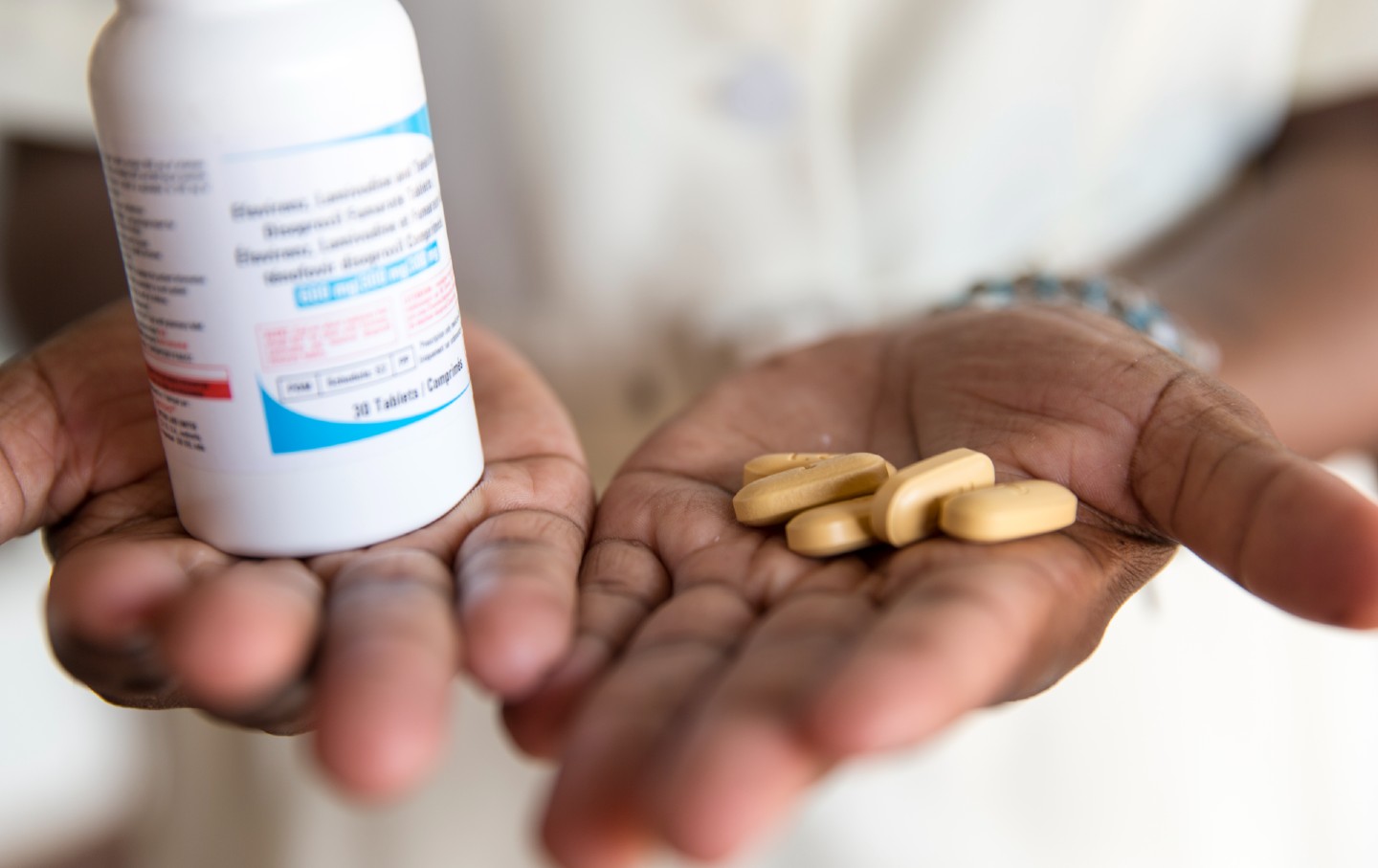The GOP’s Anti-Abortion Crusade Is Threatening HIV Treatment in Africa
As a band of Republican congresspeople has set its sights on the health program known as PEPFAR, the media has remained shamefully silent.

A nurse in a hospital shows medicines used to fight HIV infection in Zimbabwe.
(Christian Ender / Getty Images)Right now, behind closed doors, a small group of House Republicans is weakening what is by far the most successful foreign aid measure in U.S. history, a global health program that has saved the lives of 25 million people who have HIV/AIDS, mostly in Africa. The program, called Pepfar, has also allowed 5.5 million kids to be born virus-free because the United States paid for the drugs that reduced the risk of mother-to-child transmission.
Direct blame for this imminent crisis can be assigned to a small faction of right-wingers in the House. But they are getting away with it because the mainstream U.S. media, along with major political figures from both parties, have failed to keep Americans informed about the program’s astonishing success.
Pepfar stands for the President’s Emergency Plan for AIDS Relief. It was launched by George W. Bush in 2003, and overwhelming Congressional majorities in both parties have extended it every 5 years, most recently in 2018 under Donald Trump. But this time around, a small rump Republican faction has taken Pepfar hostage, dishonestly claiming that the program “promotes abortion”—even though evangelical Christians who know the program well, both Americans and Africans, heatedly deny the charge. One of the GOP ringleaders is Rep. Chris Smith, of New Jersey. Those close to him cannot explain why he reversed his past support for Pepfar.
The mainstream U.S. media malpractice is a scandal. The cable TV networks, The New York Times, and others flooded both Ukraine and Israel with reporters when fighting broke out there. But even though the threat to Pepfar has been evident for months, there have been few if any on-the-spot reports from the African nations—such as Kenya or Zimbabwe—that have seen their death rates plummet since the U.S. program was put into effect. National Public Radio, for example, hasn’t run anything on air since last October; there’s been nothing recent on the PBS NewsHour either. The New York Times has only had 5 articles over the past 6 months, none of them from Africa. The most recent appeared back on October 26.
The mainstream failure is astonishing. You could fly into Lusaka, Zambia, or Kampala, Uganda, and within 24 hours you would have inspiring first-hand testimonies from people who will tell you that they are still alive thanks to Pepfar. The failure raises the ugly suspicion that the U.S. media only prefers bad news (or no news) from Africa and other places in the Global South. (Here’s my own first-hand report back in 2014 from the southern African nation of Swaziland; I had no trouble finding enthusiastic people who gushed with thanks. Nurse/matron Precious Dube was typical: “People in America have saved the Swazi nation. If you had not helped us, our people would be sleeping in the streets and dying of disease and hunger. Instead, now, we are about to contain AIDS.”)
Dan Foote was the U.S. ambassador to Zambia from 2017-2020, and he was in chanrge of the Pepfar program there. He says Pepfar is “the most impactive foreign policy tool the U.S. has ever had on a human level,” and he warns of terrible consequences if it is weakened. “There were a couple million people in Zambia who were non-infectious because they were taking the drugs, and therefore HIV was so low in their bloodstream,” he says. “Those figures are similar across much of East and Southern Africa. What does the U.S. think is going to happen from a foreign policy standpoint if we say no, we’re going to cut out Pepfar and then 20 million people have AIDS flare-ups across Africa?”
Foote also dismisses the charge that Pepfar is somehow connected to abortion. He says, “I spent much of my time as ambassador supervising Pepfar, and the word ‘abortion’ never even came up. And, in most African countries, abortion is illegal.”
What’s more, although Pepfar has allocated approximately $110 billion to more than 50 countries since George W. Bush first proposed it, the program has not experienced a single financial scandal of any magnitude.
Shepherd Smith is an evangelical Christian, whose organization, Children’s AIDS Fund International, has worked in African health since the middle 1980s. He and his wife, Anita Moreland Smith, have visited the continent 65 times: “We counted.” Smith is angry at the small GOP band in the House who dishonestly charge that Pepfar is promoting abortion. He points out that evangelical Christian groups, from the U.S. and elsewhere, run hospitals and clinics all over the African continent. They would be the first to sound the alarm if Pepfar somehow were promoting abortion.
Meanwhile, the program hangs in the balance. The rump GOP group probably isn’t strong enough to gut it entirely, but they hope to reduce the reappropriation time from the usual 5 years to 3 years or even fewer. The shorter time frame would do severe damage. Shepherd Smith explains: “You can’t buy treatment for 25 million people one year at a time. Pharmaceutical companies have to know that they’ll have continued production in the future. Health groups that work in the field in Africa have to sign leases for their clinics.”
The next week or so is critical. But the mainstream media’s failure to report anything means the GOP House faction can keep quietly pushing its sabotage maneuver. Smith is hopeful that, even if Pepfar is weakened this year, the next Congress might have a chance to rescue it. But Pepfar could continue to die in darkness if U.S. television networks and newspapers continue, inexplicably, to ignore it.
With more media coverage, a different outcome is easily imaginable. People in the U.S. living with HIV/AIDS; progressives; health workers; African Americans; young people—all could have started to pressure Congress, and they would have been joined by American evangelical Christians who had been informed of the truth about the miraculous program. Instead, silence.
Hold the powerful to account by supporting The Nation
The chaos and cruelty of the Trump administration reaches new lows each week.
Trump’s catastrophic “Liberation Day” has wreaked havoc on the world economy and set up yet another constitutional crisis at home. Plainclothes officers continue to abduct university students off the streets. So-called “enemy aliens” are flown abroad to a mega prison against the orders of the courts. And Signalgate promises to be the first of many incompetence scandals that expose the brutal violence at the core of the American empire.
At a time when elite universities, powerful law firms, and influential media outlets are capitulating to Trump’s intimidation, The Nation is more determined than ever before to hold the powerful to account.
In just the last month, we’ve published reporting on how Trump outsources his mass deportation agenda to other countries, exposed the administration’s appeal to obscure laws to carry out its repressive agenda, and amplified the voices of brave student activists targeted by universities.
We also continue to tell the stories of those who fight back against Trump and Musk, whether on the streets in growing protest movements, in town halls across the country, or in critical state elections—like Wisconsin’s recent state Supreme Court race—that provide a model for resisting Trumpism and prove that Musk can’t buy our democracy.
This is the journalism that matters in 2025. But we can’t do this without you. As a reader-supported publication, we rely on the support of generous donors. Please, help make our essential independent journalism possible with a donation today.
In solidarity,
The Editors
The Nation








